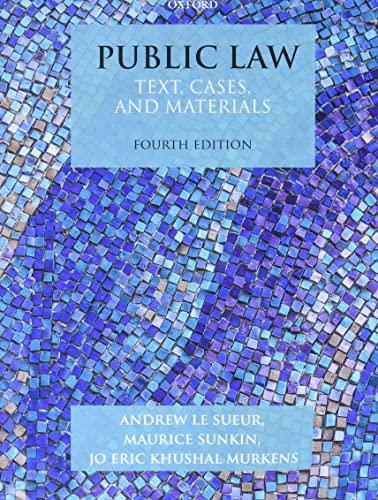Question
Family reunification is one of the cornerstones of the IRPA. Spousal sponsorships are coded FC1 which means their processing takes top priority within all Family
Family reunification is one of the cornerstones of the IRPA. Spousal sponsorships are coded FC1 which means their processing takes top priority within all Family Class cases. However, depending on the overseas visa post, it can still take several months for a spouse to be reunited with their Canadian sponsor. For sponsors whose applications are refused, the appeal process can take an additional severalmonths.The whole sponsorship process can take years.
There seems to be a disconnect between the intent of the law and policy and how it is realized in practice.
Please review thefollowingToronto Star news articleand provide your comments on this issue.
Article:
Toronto Star
Immigration appeal delays separate couples for years Indrani Banerjee waited three years for a decision from immigration on her spousal sponsorship. Now, she must wait two years for an appeal hearing. Handout / Family Indrani Banerjee wants to bring her husband, Mazhar Elahi Khan to Canada.
She's been refused and the appeal may take two years to be heard. By: Nicholas Keung Immigration reporter, Published on Mon Jan 20 2014 It took Indrani Banerjee three years to get a decision from immigration officials denying her sponsorship of her Pakistani husband. Now, the Mississauga woman must wait as long as two years for a federal tribunal to hear her appeal against Citizenship and Immigration Canada.
Banerjee, 52, who emigrated from India in 2001, and her spouse, Mazhar Elahi Khan, 45, are among thousands of couples caught up in a bureaucratic nightmare that has seen the average processing time of sponsorship appeals creep up over the last five years. "We waited three years just to get a decision on our sponsorship. Now we have to wait for another two years just to get a hearing on our appeal," said Banerjee, an accountant whose application was rejected last fall. "It is so frustrating."
She said officials denied the request because they didn't believe the marriage was genuine, as she is older than Khan. They were married in Toronto in 2010. Despite Ottawa's emphasis on family reunifications as a tenet of the immigration system, it takes about a year for Canadians to bring in their overseas spouses, depending on visa posts. Processing times can range from eight months in Poland to 32 months in Pakistan. The immigration department receives thousands of spousal sponsorship applications a year and rejects about 15 per cent of cases due to suspected fraud and failure to obtain health and criminal clearances. About half of rejected applicants pursue appeals at the tribunal. However, even if an appeal is successful, all the tribunal can do is send the case back to the visa post for a new assessment.
That means the couple must queue up and start from scratch again. Toronto immigration lawyer Raoul Boulakia said one of his clients was trying to sponsor his wife from Tanzania. The application took four years to process and was ultimately rejected. The man found out his appeal wouldn't be heard until two years later. "His wife stopped believing he loved her and tried to help her to come to Canada. She ended up divorcing him. More often people are quitting their jobs and moving to be with their spouse," said Boulakia. "It is a trend under this government and it's only getting worse. Increased delays in appeals encourage impunity (for immigration) in rejecting people who climb up huge mountains and get pushed back. . . .
Decision-makers can bank on people getting worn down." According to the Immigration and Refugee Board, which runs the immigration appeals tribunal (IAD), the number of sponsorship appeal cases has actually dropped by half from 4,945 cases in 2008 to 2,510 in the first three-quarters of 2013. However, the number of adjudicators on the tribunal is down from 35 in 2010 to just 25 today. Twelve vacancies are unfilled by Ottawa. Even though the tribunal was budgeted $17.9 million last year, it spent $15 million. Average processing time for a sponsorship appeal has shot up by 25 per cent to 20 months, from 16 months five years ago. The tribunal refers appeals to the alternative dispute resolution (ADR) program "an informal, less confrontational and more consensual approach" before a hearing is held, so the system is not clogged up. Last year, only 42 per cent of appeals went to alternative mediation, down from 51 per cent in 2008.
The tribunal said the decline in mediated cases has to do with the overall decrease in appeals that are suitable for alternative resolution, as well as reduced resources allocated to the program by immigration officials, who must consent to eligible cases. "It is not a management decision to reduce the ADR program. In fact, the IAD strives to maximize the use of ADR to achieve more finalizations when member complement is below funded levels," refugee board spokesman Charles Hawkins told the Star.
Toronto immigration lawyer Max Berger said Ottawa implemented its reforms to the refugee system in 2012 to eliminate backlogs and expedite processing of asylum claims. "There is no reason why the same cannot be done," said Berger. "My clients want their hearings yesterday. They want to reunite with their spouses as soon as possible."
Question:
Please alsoindicate how you would manage your clients' expectations when faced with the possibility of lengthy sponsorship application and appeal timelines.
Step by Step Solution
There are 3 Steps involved in it
Step: 1

Get Instant Access to Expert-Tailored Solutions
See step-by-step solutions with expert insights and AI powered tools for academic success
Step: 2

Step: 3

Ace Your Homework with AI
Get the answers you need in no time with our AI-driven, step-by-step assistance
Get Started


